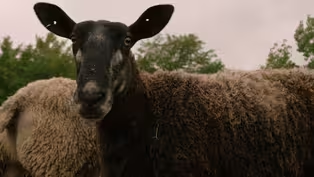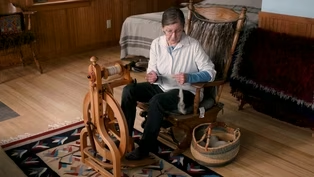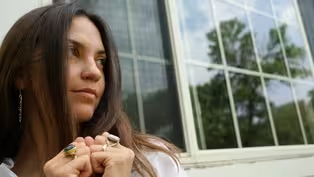
Antonio and Paulaine Jean Louis | Haiti Story
Clip: Season 15 Episode 9 | 9m 32sVideo has Closed Captions
Antonio and Paulaine Jean Louis both grew up in Haiti. They share their journey.
Antonio and Paulaine Jean Louis both grew up in Haiti. They share stories from their childhood and some of the challenges and joys of moving to the United States and raising their family here in Minnesota.
Problems playing video? | Closed Captioning Feedback
Problems playing video? | Closed Captioning Feedback
Postcards is a local public television program presented by Pioneer PBS
Production sponsorship is provided by contributions from the voters of Minnesota through a legislative appropriation from the Arts and Cultural Heritage Fund, Explore Alexandria Tourism, Shalom Hill Farm, West Central...

Antonio and Paulaine Jean Louis | Haiti Story
Clip: Season 15 Episode 9 | 9m 32sVideo has Closed Captions
Antonio and Paulaine Jean Louis both grew up in Haiti. They share stories from their childhood and some of the challenges and joys of moving to the United States and raising their family here in Minnesota.
Problems playing video? | Closed Captioning Feedback
How to Watch Postcards
Postcards is available to stream on pbs.org and the free PBS App, available on iPhone, Apple TV, Android TV, Android smartphones, Amazon Fire TV, Amazon Fire Tablet, Roku, Samsung Smart TV, and Vizio.
Providing Support for PBS.org
Learn Moreabout PBS online sponsorship(upbeat music) - One thing I remember when I have to go to school, because without money to pay for taxi, I have to walk about one hour to go to school and one hour to go back.
Walk, not drive, and I see different here, the kids have the buses and 16 years old, they have car.
I always say them to explain, you know, how life was for us, growing up in Haiti, and for them, is completely different living in the States.
(water hissing) (upbeat music) (bag rustling) (upbeat music) (Paulaine laughing) (food sizzling) One thing I like Haitian culture, my friend always joking, we don't measure nothing.
(Paulaine laughing) The other thing, how about the, when they ask for the recipe, we say, "We just put whatever feels right."
(Paulaine laughing) That's why they always joke with us.
(upbeat music) (serene music) - I know a Haiti that was very enjoyable when I was a boy.
Quiet, clean, everybody will want to go there.
I grew up in Cap-Haitien.
Cap-Haitien is the touristic capital of the country.
That's where you have everything that someone that is not from Haiti will want to go.
There's a lot to enjoy in Cap-Haitien and you have all the ocean, the beach that people go to.
It was very enjoyable.
(serene music) (food sizzling) - We decide to move to United States because of my husband's job.
- If you can picture what an ambassador will do as a job, that's basically what my job is here, representing what the organization is doing in Haiti and Haiti itself.
- When I first moved to United States, it was really hard for me because I didn't have any English at all and we didn't live in the Haitian community.
One time when our kids have to go to first day of school, my husband had to move back to Haiti for a meeting and I'm the one have to bring the kid to the bus station and to go to the meeting.
They say the bus, and my understanding, I think they say, "Green bus," and the first day of school I was waiting for the green bus come, (Paulaine chuckling) and I didn't send the kid to school this time.
When I call my friend, she tried to understand what I say to figure out and I told her, "I didn't send the kids."
She say, why?
I say, "I didn't see the green bus."
She say, "No, we never, we don't have green bus.
"We, all the busses are yellow," (Paulaine laughing) and after that I said, "Okay, I have to go to school," and I went to a community college for English, my first English class.
- I went back to Haiti to keep working with Children of the Promise giving full-time.
I thought that would be very easy to come and then go get visa and come back here.
It was not that easy.
Now I end up stuck in Haiti for eight years of my life.
- And it was hard for me because the kids kept asking, "Where is Dad?
"When Dad is coming back?"
- I could obviously with the technology do video conference call with them, talk with them on video, but you get to a point where you look at videos, you see your daughter doing basketball, doing sport and you want to be there, and it was so hard, and I remember going single night crying because I could not see my kids.
It was hard.
- Finally in 2020, they send his visa in Haiti for interviewing at the embassy.
We went to Haiti with all the family.
They say we have to present at the embassy.
This is gonna take maybe a maximum one month, and after the interview, everything went closed, and my families was stuck there for five months.
- Every step was difficult.
So after five months, finally we could come back here.
- I have a college degree in Haiti, but when I graduate from, before I graduate from high school, everybody I knew in the area know I want to be a nurse.
This is what I always want to be.
My dad didn't have any education, he never got in school, but I told him I want to be a nurse.
He work hard for me to be a nurse, but unfortunately he passed away.
I couldn't go to private school to pay for the school.
I couldn't be a nurse.
When we moved to Minnesota, I went to Ridgewater this time and this time start to get all the classes for my nursing school.
So I graduate 2020 at Ridgewater for the Nurse Helping program.
Yes, I'm in nurse after 2020.
That was amazing for me, and you know my dream come true.
(upbeat music) - This is a, something that has come from Haiti, and you can see here, this is inside of the Haitian flag you have this emblem.
Then you have a palm tree here, you have bombards.
You know this, Haiti was the first black nation that fought slavery.
You can read here, "L'Union fait la force."
That is something I talk about, which is connecting people, the sense of coming together that people have.
I love Haiti.
I love what I grew up into, I love it, but between Haiti and the kids that grow up here, it's two different stories.
You want to make sure that the kids, they are happy.
They have a sense, the same things that I grew up into.
I thought, well, education will be a very good thing that I grew up with.
You want to offer the best to your kids.
- I remember, I used to work at Taco Bell, my first job.
Every day after work I cry because the way people treat you.
You don't speak English, you are an immigrant.
They think, "Why you come to the United States?"
They don't understand.
I always tell people, when you have a family, you do everything you can do, especially for your kids.
(serene music) - In hard times, we need to show those kind of support.
We need to, especially with the immigration problem that is going all over, all around the world right now.
I think that we gotta be human in the way we do things.
Let the political people do the politics, but as humans, community, how do we embrace, how do we help?
- You know, when you can help someone, you just do it, and that's why God said, "Love your neighbor as you love yourself."
(upbeat music continues) (upbeat music continues) - [Narrator] "Postcards" is made possible by the Minnesota Arts and Cultural Heritage Fund and the citizens of Minnesota.
Additional support provided by Margaret A. Cargill Philanthropies.
Mark and Margaret Yackel-Juleen, on behalf of Shalom Hill Farms, a retreat and conference center in a prairie setting near Windom, Minnesota.
On the web at shalomhillfarm.org.
Alexandria, Minnesota, a year-round destination with hundreds of lakes, trails and attractions for memorable vacations and events.
More information at explorealex.com.
The Lake Region Arts Council's arts calendar, an arts and cultural heritage funded digital calendar showcasing upcoming art events and opportunities for artists in West Central Minnesota.
On the web at lrac4calendar.org.
Playing today's new music, plus your favorite hits, 96.7 KRAM, online at 967kram.com.
(upbeat music)
Haiti Story, Digital Artist, Farm Weaver
Preview: S15 Ep9 | 40s | Immigration from Haiti; Nicole Brenny's digital art; and Laura Demuth's wool crafts. (40s)
Video has Closed Captions
Clip: S15 Ep9 | 11m 32s | Laura Demuth is an expert weaver on a farm with her husband, Steve. (11m 32s)
Video has Closed Captions
Clip: S15 Ep9 | 8m 42s | Nicole Brenny is an electronic and experimental musician and artist from the prairie. (8m 42s)
Providing Support for PBS.org
Learn Moreabout PBS online sponsorship

- Arts and Music
The Best of the Joy of Painting with Bob Ross
A pop icon, Bob Ross offers soothing words of wisdom as he paints captivating landscapes.












Support for PBS provided by:









